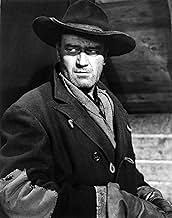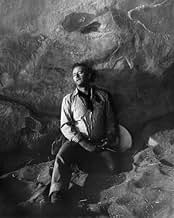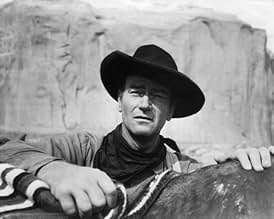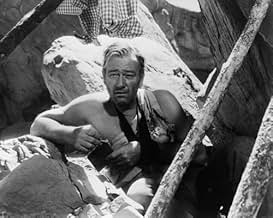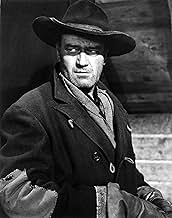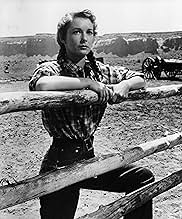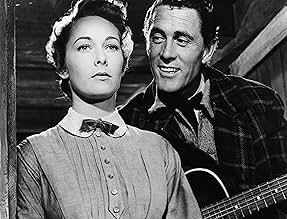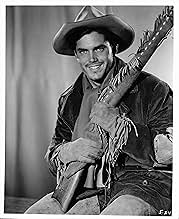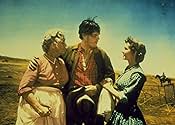Un veterano de la Guerra de Secesión estadounidense emprende un viaje para rescatar a su sobrina de los comanches.Un veterano de la Guerra de Secesión estadounidense emprende un viaje para rescatar a su sobrina de los comanches.Un veterano de la Guerra de Secesión estadounidense emprende un viaje para rescatar a su sobrina de los comanches.
- Dirección
- Guionistas
- Elenco
- Premios
- 4 premios ganados y 4 nominaciones en total
Patrick Wayne
- Lt. Greenhill
- (as Pat Wayne)
- Dirección
- Guionistas
- Todo el elenco y el equipo
- Producción, taquilla y más en IMDbPro
Opiniones destacadas
A John Ford masterwork that's rich and spacious, just like the gorgeous western countryside that splashes every backdrop. John Wayne plays a flawed centerpiece, a grizzled former soldier with a chip on his shoulder and a strange, conflicted relationship with his extended family. As usual, cool confidence and raw masculinity seep from his pores and he takes hold of each scene with a pair of strong, old cowherder's hands. This is a film that rewards an active imagination, as there's much going on between the lines that, without being spelled out, brands the cast with an unusual level of depth and detail. Unspoken histories flesh out most every character, allowing even generic walk-ons to mosey into the picture at most any moment and cast ripples throughout the entire tapestry. It can be slow at times, and the casting of a very obviously non-native actor to lead the stereotypical enemy Comanche tribe doesn't sit well, but both such faults can be generally chalked up to the dated eccentricities of that era. Take the time to soak it all in, to look deeper than the superficial story, and you'll find a wealth of spoils.
John Ford is a classic Western filmmaker (though certainly not the only genre in which he excelled), employing the classic Western film star, John Wayne, in perhaps one of the most underappreciated films of our time. Ford builds a thoroughly entertaining movie which explores classic Western themes without necessarily relying on these themes to drive the plot.
Like any good Western, we are inorexably drawn to a kind of Cowboys vs. Indians saga, but Ford manages to draw us into the conflict in such a way that the mere "Cowboys good, Indians bad" aesthetic isn't really applicable here. While relying on the archetypical roles of the two groups to set up a conflict, Ford is ahead of his time in managing to characterize the Indians as more than "noble savages". Wayne's character's (Ethan Edwards) hatred of "the Commanch" is called into question a number of times, especially in his stormy relationship with adopted nephew and fellow searcher Martin Pawley (Jeffrey Hunter), who we are told is a quarter-Indian himself, and cannot bring himself to find the same sort of hatred for the Indians that Ethan holds.
Ethan was a Confederate soldier in the Civil War, returning to his brother's Texas homestead after the war. A group of Commanches, led by the ominous Chief Scar, route and kill his brother's family while Ethan and Martin are investigating a cattle rustling, the Commaches' diversionary tactic. The Indians took the family's youngest daughter, and the majority of the film has us following Ethan and Martin in their attempts to track down Scar and take back the girl, Debbie (played by Lorna and Natalie Wood, at different times).
Such a situation sets up one of the many moral ambiguities that make this more than an ordinary Western: the Commanches slaughtered Ethan's brother and his family - he seemingly has reason to hate them with the almost crazy passion that he does. Yet the more naive Martin cannot bring himself to hate them in such a way, and the split between them becomes a major point of contention when it becomes clear that Debbie has more or less been adopted as a Commanche (the two "Searchers" chase after her for about five years in film time). Furthermore, when the two "Searchers" actually meet Scar, who they've been chasing for years, he is presented as a rather intelligent character, although certainly one filled with vengance - he, too, has his reasons for waging war with the likes of Ethan and Martin, and cannot merely be written off a the type of bloodthirsty savage that is typical of the portrayal of most Indians within the genre.
The film relies on enough classic Western material to imbue with the feel with the sense of such pictures. Aside from the question of Ethan's morality, Wayne plays him with classic John Wayne freewheeling confidence and swagger that made the actor such an icon, and it comes off quite well. We are also given a side story involving Martin's romance with the hard-as-nails Laurie Jurgensen (played by Vera Miles, best known for playing Janet Leigh's sister in "Psycho"). The relationship is from a classic, archetypical Western mold - the two have been in love since they were kids, but Martin has responsibilites to his family that stop him from making the proper time for his beau, and his rough frontier-uprbringing leave him seemingly lacking the proper sensitivity for dealing with Laura (though he does, of course, have a heart of gold).
As a side note, this film should prove immensely interesting to any serious fan of the "Star Wars" trilogy (the original one). While those films undoubtably draw a great deal of inspiration from Kurosawa's samurai films, there is most certainly a great deal (especially in the film subtitled "A New Hope") drawn from here. One scene in particular (when Luke returns to his farm after stormtroopers have blasted in pieces) is virtually ripped straight from "The Searchers". Ford's film is also full of the sort of gallows humor present throughout the trilogy, and even incorporates some rather goofy characters, the half-cracked Mose Harper (Hank Warden) and the incredibly over-the-top rival for Laura's hand Charlie McCorry (Ken Curtis), without ruining the overall serious feel of the film, but managing to squeeze laughs out of absurd situations (such as a fight between Martin and Charlie) without compromising the ability to quickly return to a solemn tone. Such deft touch, as well as the addition of wise-cracking dialogue (provided largely by Wayne and Ward Bond here) are a large part of what made the original trilogy so successful, and it's strikingly similar to the type of paradigm on display between various characters here.
Regardless of ranting and raving about Star Wars, however, this is an excellent film on it's own merit.
Like any good Western, we are inorexably drawn to a kind of Cowboys vs. Indians saga, but Ford manages to draw us into the conflict in such a way that the mere "Cowboys good, Indians bad" aesthetic isn't really applicable here. While relying on the archetypical roles of the two groups to set up a conflict, Ford is ahead of his time in managing to characterize the Indians as more than "noble savages". Wayne's character's (Ethan Edwards) hatred of "the Commanch" is called into question a number of times, especially in his stormy relationship with adopted nephew and fellow searcher Martin Pawley (Jeffrey Hunter), who we are told is a quarter-Indian himself, and cannot bring himself to find the same sort of hatred for the Indians that Ethan holds.
Ethan was a Confederate soldier in the Civil War, returning to his brother's Texas homestead after the war. A group of Commanches, led by the ominous Chief Scar, route and kill his brother's family while Ethan and Martin are investigating a cattle rustling, the Commaches' diversionary tactic. The Indians took the family's youngest daughter, and the majority of the film has us following Ethan and Martin in their attempts to track down Scar and take back the girl, Debbie (played by Lorna and Natalie Wood, at different times).
Such a situation sets up one of the many moral ambiguities that make this more than an ordinary Western: the Commanches slaughtered Ethan's brother and his family - he seemingly has reason to hate them with the almost crazy passion that he does. Yet the more naive Martin cannot bring himself to hate them in such a way, and the split between them becomes a major point of contention when it becomes clear that Debbie has more or less been adopted as a Commanche (the two "Searchers" chase after her for about five years in film time). Furthermore, when the two "Searchers" actually meet Scar, who they've been chasing for years, he is presented as a rather intelligent character, although certainly one filled with vengance - he, too, has his reasons for waging war with the likes of Ethan and Martin, and cannot merely be written off a the type of bloodthirsty savage that is typical of the portrayal of most Indians within the genre.
The film relies on enough classic Western material to imbue with the feel with the sense of such pictures. Aside from the question of Ethan's morality, Wayne plays him with classic John Wayne freewheeling confidence and swagger that made the actor such an icon, and it comes off quite well. We are also given a side story involving Martin's romance with the hard-as-nails Laurie Jurgensen (played by Vera Miles, best known for playing Janet Leigh's sister in "Psycho"). The relationship is from a classic, archetypical Western mold - the two have been in love since they were kids, but Martin has responsibilites to his family that stop him from making the proper time for his beau, and his rough frontier-uprbringing leave him seemingly lacking the proper sensitivity for dealing with Laura (though he does, of course, have a heart of gold).
As a side note, this film should prove immensely interesting to any serious fan of the "Star Wars" trilogy (the original one). While those films undoubtably draw a great deal of inspiration from Kurosawa's samurai films, there is most certainly a great deal (especially in the film subtitled "A New Hope") drawn from here. One scene in particular (when Luke returns to his farm after stormtroopers have blasted in pieces) is virtually ripped straight from "The Searchers". Ford's film is also full of the sort of gallows humor present throughout the trilogy, and even incorporates some rather goofy characters, the half-cracked Mose Harper (Hank Warden) and the incredibly over-the-top rival for Laura's hand Charlie McCorry (Ken Curtis), without ruining the overall serious feel of the film, but managing to squeeze laughs out of absurd situations (such as a fight between Martin and Charlie) without compromising the ability to quickly return to a solemn tone. Such deft touch, as well as the addition of wise-cracking dialogue (provided largely by Wayne and Ward Bond here) are a large part of what made the original trilogy so successful, and it's strikingly similar to the type of paradigm on display between various characters here.
Regardless of ranting and raving about Star Wars, however, this is an excellent film on it's own merit.
If there is only one western that you must see from John Ford, I would say it is this one; though THE MAN WHO SHOT LIBERTY VALENCE is also absolutely unique, outstanding too. The element that makes those two films so stunning is not only the directing but the plot. This scheme was never made before and rarely copied since. Of course THE SEARCHERS plot will more or less inspire THE PROFESSIONALS, one decade later, from director Richard Brooks; just the overall scheme and especially ending, moral. The settings, landscape, music, acting, characters, everything is jawdropping and provokes emotion for anyone sensitive enough to feel all the power of this terrififc western. John Wayne gives his best performance, even better than in WAKE OF THE RED WITCH. One of the greatest ending ever.
The Searchers(1956) has been reflected to death by many filmmakers in their own work with main ideas, situations, and plot as guide. Many elements of The Searchers(1956) influenced film directors ranging from Brian De Palma, George Lucus, Martin Scorsese, Paul Schrader, and Sergio Leone. There are scores of other movie makers whom I cannot list at the top of my head that were affected by this one film. Obvious film influences are Once Upon a Time in the West(1968), Obsession(1976), Taxi Driver(1976), Star Wars(1977), and Hardcore(1979). It shows that great works of cinema are also able to inspire many admirers and disciples. Only films(stories) by Akira Kurosawa has been reflected more often by film directors than The Searchers(1956).
John Wayne was legendary American film star and big box office draw by 1956. The Searchers(1956) lends creedence to John Wayne being an exceptional actor enforced by his multi-layered performance. In a career that spanned five decades, The Searchers(1956) is the efflorescence of John Wayne. John Wayne gives a complex/flawed portrait of a man looking for redemption and salvation. One fine moment that examplifies the multi-layerness of John Wayne's performance is the look on Ethan Edwards face as he feys over what will happen to his brother and family. The Searchers(1956) was to John Wayne's career what Treasure of the Sierra Madre(1948) was to Humphrey Bogart and Vertigo(1958) was to James Stewart.
Story is about drifting, trying find something which is self-meaningful. Ethan Edwards is such a drifter who is always in search of a purpose. The Searchers(1956) is really about drifting in the American Frontier and search for self-discovery. There were many drifters like Ethan Edwards in the Old West especially in the wake of the Civil War. The Cowboy drifter in the Old West is almost the equivalent of the Samurai ronin in Tokugawa Japan Era. These drifters were men who were on the go, had temporary employment, and always wondered about their existence in life.
Rare individualistic motion picture in the old studio system days when many Hollywood films were studio controlled. The Searchers(1956) defies the typical 1950s Hollywood film presentation because its a director's picture. Excells on a visual level with interesting camera placement. Camera framing also plays a psychological and visual role in representation of two conflicting worlds(Civilized West and Wild West). Helped by crisp and flawless editing that flows the plot along effortlessly. Shades of Homer's THE ODYSSEY are penetrated into the heart of the story with irony.
Deals with racial prejudice with honest and truthful gusto. Racial prejudice in The Searchers(1956) is filmed in terms of emotional and psychological depth. The racial prejudice of the protagonist echos the prejudice of many white people in the Old West felt towards native Americans. The relationship between Ethan Edwards and Martin Pawley is met by distrust, prejudice, and sarcasm. Only towards the end does Ethan Edwards begin to show some sign of acception and respect for Martin Pawley. Shows that people are willing to change if they are willing to confront the dark side of humanity.
John Ford was the one director who was able to channel the talents of John Wayne to full heights. He made it possible for John Wayne to become an American film star by casting him in Stagecoach(1939). The other major director John Wayne had great success with was Howard Hawks. The Searchers(1956) is the greatest film of the Ford-Wayne tandem. Each are at their highest and most professional peak as film artists. In film working relationship they were halves of one and one of halves.
Ethan Edwards fullfills the requirements of hero and villain in narrative plot structure. This makes him an anti-hero with human strengths and flaws so typical of this type of protagonist. Its funny that John Wayne detested Italian Westerns and yet played a character in The Searchers(1956) who fits the mold of the Spaghetti Western anti-hero. Ethan Edwards is the closet thing to a villain John Wayne played in the movies. At the beginning Ethan Edwards lives only for hate and revenge. By the end he becomes merciful and forgiving.
On-location photography gives the film its rugged character. Monument Valley is depicted with beauty, mystery, and savagery. The people in the story are represented by their environment and location. Monument Valley was a favorite film location of John Ford who was obsessed by its untamed and individualistic nature. Monument Valley site is explored on a physical, psychological, and social level. Scenery is an important character of the Classic American Western and none so more true then in The Searchers(1956).
Another major motif in The Searchers(1956) is redemption. The path of hate and vengeance is replaced by compassion and forgiveness. Its this motif as well as others that makes the story a subtle Catholic driven tale. Redemption is the saving grace for a destructive and negative character like Ethan Edwards. Revenge until the climatic moment takes importance over everything else in Ethan Edwards life. Redemption is one motif from The Searchers(1956) that influenced Scorsese and Schrader.
Martin Pawley goes with Ethan Edwards on revenge pledge as way of following path of fealty. The moment of Ethan picking up his niece and holding her with compassion is a tender one. Jeffrey Hunter as Martin Pawley provides a nice foil to John Wayne's Ethan Edwards. Cinematography in The Searchers(1956) is forceful and graceful. In time The Searchers takes place, drifters like Ethan Edwards are dime a dozen but by the period depicted in films of Sergio Leone and Sam Peckinaph, they are nearly extinct. The Searchers(1956) is a milestone in both American and World cinema.
John Wayne was legendary American film star and big box office draw by 1956. The Searchers(1956) lends creedence to John Wayne being an exceptional actor enforced by his multi-layered performance. In a career that spanned five decades, The Searchers(1956) is the efflorescence of John Wayne. John Wayne gives a complex/flawed portrait of a man looking for redemption and salvation. One fine moment that examplifies the multi-layerness of John Wayne's performance is the look on Ethan Edwards face as he feys over what will happen to his brother and family. The Searchers(1956) was to John Wayne's career what Treasure of the Sierra Madre(1948) was to Humphrey Bogart and Vertigo(1958) was to James Stewart.
Story is about drifting, trying find something which is self-meaningful. Ethan Edwards is such a drifter who is always in search of a purpose. The Searchers(1956) is really about drifting in the American Frontier and search for self-discovery. There were many drifters like Ethan Edwards in the Old West especially in the wake of the Civil War. The Cowboy drifter in the Old West is almost the equivalent of the Samurai ronin in Tokugawa Japan Era. These drifters were men who were on the go, had temporary employment, and always wondered about their existence in life.
Rare individualistic motion picture in the old studio system days when many Hollywood films were studio controlled. The Searchers(1956) defies the typical 1950s Hollywood film presentation because its a director's picture. Excells on a visual level with interesting camera placement. Camera framing also plays a psychological and visual role in representation of two conflicting worlds(Civilized West and Wild West). Helped by crisp and flawless editing that flows the plot along effortlessly. Shades of Homer's THE ODYSSEY are penetrated into the heart of the story with irony.
Deals with racial prejudice with honest and truthful gusto. Racial prejudice in The Searchers(1956) is filmed in terms of emotional and psychological depth. The racial prejudice of the protagonist echos the prejudice of many white people in the Old West felt towards native Americans. The relationship between Ethan Edwards and Martin Pawley is met by distrust, prejudice, and sarcasm. Only towards the end does Ethan Edwards begin to show some sign of acception and respect for Martin Pawley. Shows that people are willing to change if they are willing to confront the dark side of humanity.
John Ford was the one director who was able to channel the talents of John Wayne to full heights. He made it possible for John Wayne to become an American film star by casting him in Stagecoach(1939). The other major director John Wayne had great success with was Howard Hawks. The Searchers(1956) is the greatest film of the Ford-Wayne tandem. Each are at their highest and most professional peak as film artists. In film working relationship they were halves of one and one of halves.
Ethan Edwards fullfills the requirements of hero and villain in narrative plot structure. This makes him an anti-hero with human strengths and flaws so typical of this type of protagonist. Its funny that John Wayne detested Italian Westerns and yet played a character in The Searchers(1956) who fits the mold of the Spaghetti Western anti-hero. Ethan Edwards is the closet thing to a villain John Wayne played in the movies. At the beginning Ethan Edwards lives only for hate and revenge. By the end he becomes merciful and forgiving.
On-location photography gives the film its rugged character. Monument Valley is depicted with beauty, mystery, and savagery. The people in the story are represented by their environment and location. Monument Valley was a favorite film location of John Ford who was obsessed by its untamed and individualistic nature. Monument Valley site is explored on a physical, psychological, and social level. Scenery is an important character of the Classic American Western and none so more true then in The Searchers(1956).
Another major motif in The Searchers(1956) is redemption. The path of hate and vengeance is replaced by compassion and forgiveness. Its this motif as well as others that makes the story a subtle Catholic driven tale. Redemption is the saving grace for a destructive and negative character like Ethan Edwards. Revenge until the climatic moment takes importance over everything else in Ethan Edwards life. Redemption is one motif from The Searchers(1956) that influenced Scorsese and Schrader.
Martin Pawley goes with Ethan Edwards on revenge pledge as way of following path of fealty. The moment of Ethan picking up his niece and holding her with compassion is a tender one. Jeffrey Hunter as Martin Pawley provides a nice foil to John Wayne's Ethan Edwards. Cinematography in The Searchers(1956) is forceful and graceful. In time The Searchers takes place, drifters like Ethan Edwards are dime a dozen but by the period depicted in films of Sergio Leone and Sam Peckinaph, they are nearly extinct. The Searchers(1956) is a milestone in both American and World cinema.
A second look at this film is long overdue. It's been hailed by many as a masterpiece. Even the anti-Ford critic David Thomson in The New Biographical Dictionary of Film classifies it as an exceptional work. I don't know whether it's the Ford mystique, the Wayne icon, or the mesmerizing beauty of Monument Valley that holds this movie to a different standard from most Westerns. But something is at work that numbs a critical eye-level inquiry. The Searchers is a good film, but no masterpiece, and certainly does not belong in the American Film Institute's list of top 100 films of all time. A brief look at some of the more obvious defects:
Ford makes picture postcards out of the soaring spires and buttes. At no point, however, does he come to grips with the real harshness of the terrain. This is desert country. Hardly anything grows-- just look at the sparseness of greenery. Yet we're told cattle herds feed here in large enough numbers to support families, (In the movie, Jorgensen's right-- they would be better off raising pigs than cattle). Then too, there is absolutely no hint of the desert heat or cold affecting anything or anybody. The parties go here and there with slim regard for what the conditions actually afford. In short, the celebrated landscape amounts to little more than a majestic backdrop without a true reality of its own. Ford may love this Spartan terrain, but he gives it scant respect.
Similarly, the film-maker undercuts the naturalism of the vaunted visuals. The audience gets an awesome flow of natural wonders, only to have the flow interrupted by outdoor sets so painfully obvious, they can't be ignored, (consider the Futterman ambush scene, for one). As a result, visual continuity is sacrificed and so is fidelity to the intended atmosphere. Suddenly we're jolted out of the scenic spell back into recognition that this is, after all, only a movie. Where, one wonders, was Ford's very real poetic eye in these disruptive scenes, and why didn't he insist on shooting all outdoor scenes outdoors-- especially after traveling to Colorado for the great snow scenes. As a premier film-maker, I'm sure he had the clout. Nonetheless, the lapse is another glaring defect.
There's another problem with respect, this time for the adversary. In fact, the Indians do get some concessions--Scar is provided a moment of motivation and a good sarcastic aside-- but not much else. As in Ford's cavalry cycle, aboriginal peoples still exist as convenient devices and sitting ducks. From the film's several battles, it seems the Indians know nothing about combat tactics. Stupidly, they never attack unless an escape route is left open to the fleeing settlers. And when they attack frontally across the river or in front of the cave, they mass in a bunch so the dug-in whites can hardly miss. No wonder there are so few Indians left. In most Westerns, this cliché would not even merit comment, but remember this one's supposed to be a "masterpiece".(For a gauge of Ford's dishonesty, compare his cardboard warriors with the skilled and savvy combatants in the similarly themed "Ulzana's Raid" {1973}).
For what is required of the actors, contrast the first ten minutes with the movie's remainder. Those first few minutes are little short of superb. There's a low-key naturalism and subtlety that's fascinating-- Just who is Ethan Edwards? What is the tension between his brother and him? And where did he get that impressive war medal? The well-crafted impression is that of real people concealing true feelings, while groping toward some kind of reconciliation across unspoken barriers. Then Ward Bond and the posse arrive and slam-bang stereotypes take over. The promising beginning is lost, while Ford reverts to form by replacing character with caricature. Bond, for example, stands not just as a gruff old man, but as The Gruff Old Man; Jeffrey Hunter is not just a callow youth, but The Callow Youth; and most egregiously, Ken Curtis is not merely one more country yokel, but The Rub-your-Nose-In-It Country Yokel. Moreover, conversation ceases, hat-throwing and shouting take over, and genuine interaction gives way to exaggerated personalities doing little more than bouncing off one another. Even Wayne's one-note avenger comes close to parody, (unlike others, however, he is never mocked). Of course, such caricatures provide ample grist for Ford's broad idea of humor. Nonetheless, the comic set-ups come perilously close at times to a Three Stooges level, particularly the scenes with Old Mose, and with Bond and Patrick Wayne. I'm not against comic relief, but I am when it flirts with burlesque in an otherwise serious film.
More could be pointed out, such as the distracting subplots, or the ludicrous wedding sequence, or most glaringly, the climax with its sudden, unmotivated change of heart-- after all, it's the racial conflict that drives the plot. I guess what really bothers me is how blithely Ford substitutes his own highly simplistic vision of the Old West for any really plausible version. There's a basic lack of respect for the material, which allows, for example, such facile touches as Jorgensen's unweathered two-story wooden house in the middle of the desert, or Vera Miles' brocaded form-fitting wedding gown that appears to have been flown in from Paris. My point is not that the film lacks merit-- the justly celebrated doorway shots, for example. Rather, it's one of perspective-- this is an entertaining film but far from a masterpiece.The Searchers may be lauded and popular with many. Nonetheless, beneath the glossy surface lies an under-developed theme that really deserved better than standard stock company treatment. In short, Thomson is wrong. The Searchers is not an exception to Ford's usual product. Rather, it's just a little less compromised.
Ford makes picture postcards out of the soaring spires and buttes. At no point, however, does he come to grips with the real harshness of the terrain. This is desert country. Hardly anything grows-- just look at the sparseness of greenery. Yet we're told cattle herds feed here in large enough numbers to support families, (In the movie, Jorgensen's right-- they would be better off raising pigs than cattle). Then too, there is absolutely no hint of the desert heat or cold affecting anything or anybody. The parties go here and there with slim regard for what the conditions actually afford. In short, the celebrated landscape amounts to little more than a majestic backdrop without a true reality of its own. Ford may love this Spartan terrain, but he gives it scant respect.
Similarly, the film-maker undercuts the naturalism of the vaunted visuals. The audience gets an awesome flow of natural wonders, only to have the flow interrupted by outdoor sets so painfully obvious, they can't be ignored, (consider the Futterman ambush scene, for one). As a result, visual continuity is sacrificed and so is fidelity to the intended atmosphere. Suddenly we're jolted out of the scenic spell back into recognition that this is, after all, only a movie. Where, one wonders, was Ford's very real poetic eye in these disruptive scenes, and why didn't he insist on shooting all outdoor scenes outdoors-- especially after traveling to Colorado for the great snow scenes. As a premier film-maker, I'm sure he had the clout. Nonetheless, the lapse is another glaring defect.
There's another problem with respect, this time for the adversary. In fact, the Indians do get some concessions--Scar is provided a moment of motivation and a good sarcastic aside-- but not much else. As in Ford's cavalry cycle, aboriginal peoples still exist as convenient devices and sitting ducks. From the film's several battles, it seems the Indians know nothing about combat tactics. Stupidly, they never attack unless an escape route is left open to the fleeing settlers. And when they attack frontally across the river or in front of the cave, they mass in a bunch so the dug-in whites can hardly miss. No wonder there are so few Indians left. In most Westerns, this cliché would not even merit comment, but remember this one's supposed to be a "masterpiece".(For a gauge of Ford's dishonesty, compare his cardboard warriors with the skilled and savvy combatants in the similarly themed "Ulzana's Raid" {1973}).
For what is required of the actors, contrast the first ten minutes with the movie's remainder. Those first few minutes are little short of superb. There's a low-key naturalism and subtlety that's fascinating-- Just who is Ethan Edwards? What is the tension between his brother and him? And where did he get that impressive war medal? The well-crafted impression is that of real people concealing true feelings, while groping toward some kind of reconciliation across unspoken barriers. Then Ward Bond and the posse arrive and slam-bang stereotypes take over. The promising beginning is lost, while Ford reverts to form by replacing character with caricature. Bond, for example, stands not just as a gruff old man, but as The Gruff Old Man; Jeffrey Hunter is not just a callow youth, but The Callow Youth; and most egregiously, Ken Curtis is not merely one more country yokel, but The Rub-your-Nose-In-It Country Yokel. Moreover, conversation ceases, hat-throwing and shouting take over, and genuine interaction gives way to exaggerated personalities doing little more than bouncing off one another. Even Wayne's one-note avenger comes close to parody, (unlike others, however, he is never mocked). Of course, such caricatures provide ample grist for Ford's broad idea of humor. Nonetheless, the comic set-ups come perilously close at times to a Three Stooges level, particularly the scenes with Old Mose, and with Bond and Patrick Wayne. I'm not against comic relief, but I am when it flirts with burlesque in an otherwise serious film.
More could be pointed out, such as the distracting subplots, or the ludicrous wedding sequence, or most glaringly, the climax with its sudden, unmotivated change of heart-- after all, it's the racial conflict that drives the plot. I guess what really bothers me is how blithely Ford substitutes his own highly simplistic vision of the Old West for any really plausible version. There's a basic lack of respect for the material, which allows, for example, such facile touches as Jorgensen's unweathered two-story wooden house in the middle of the desert, or Vera Miles' brocaded form-fitting wedding gown that appears to have been flown in from Paris. My point is not that the film lacks merit-- the justly celebrated doorway shots, for example. Rather, it's one of perspective-- this is an entertaining film but far from a masterpiece.The Searchers may be lauded and popular with many. Nonetheless, beneath the glossy surface lies an under-developed theme that really deserved better than standard stock company treatment. In short, Thomson is wrong. The Searchers is not an exception to Ford's usual product. Rather, it's just a little less compromised.
¿Sabías que…?
- TriviaBeulah Archuletta (Look) was found crying in one of the tipis by John Wayne in between shooting scenes. When Wayne asked her why she was crying, she responded that she was going to miss her son's wedding because she was filming her scenes at the time. Wayne stopped production of the film for a few days and flew her to California so that she could attend the wedding.
- ErroresThe "dead" Indian under the rock, when the rock is removed, is clearly breathing.
- Créditos curiososThe credits state this Warner Brothers film is in VistaVision; this may be the only Warner film in VistaVision.
- ConexionesEdited into Histoire(s) du cinéma: Fatale beauté (1994)
- Bandas sonorasThe Searchers (Main Theme)
Composed by Max Steiner
Lyrics by Stan Jones
Sung by Sons of the Pioneers (uncredited)
Selecciones populares
Inicia sesión para calificar y agrega a la lista de videos para obtener recomendaciones personalizadas
- How long is The Searchers?Con tecnología de Alexa
- Why did the Comanches attack the home of Aaron and Martha to begin with?
- Did Ethan and Martha have an affair?
- Is this based on a true story?
Detalles
Taquilla
- Presupuesto
- USD 3,750,000 (estimado)
- Total a nivel mundial
- USD 1,071
- Tiempo de ejecución1 hora 59 minutos
Contribuir a esta página
Sugiere una edición o agrega el contenido que falta

Principales brechas de datos
By what name was Más corazón que odio (1956) officially released in India in Hindi?
Responda




